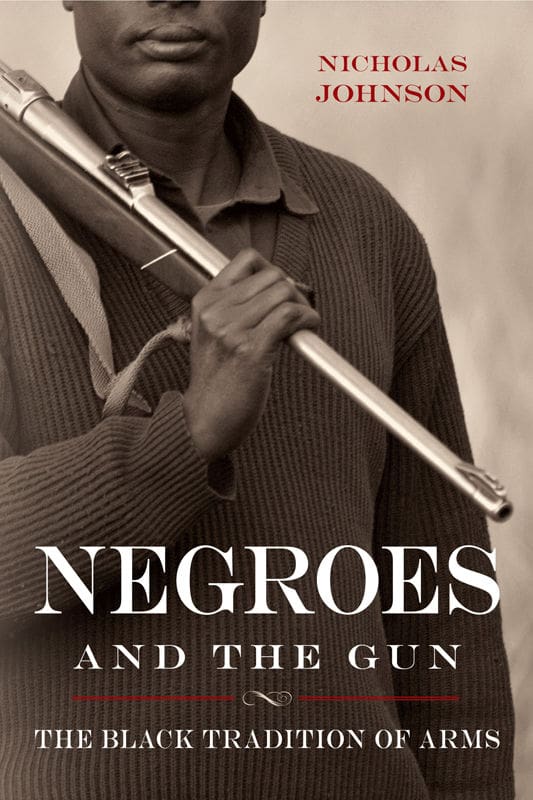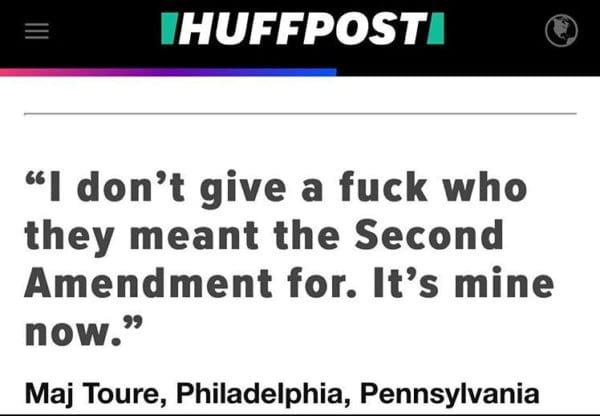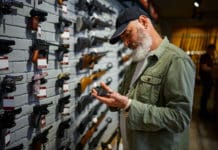Martin Luther King Jr. would have been 89 years old today, were he not assassinated in 1968. On the third Monday in January we observe MLK Jr. Day and celebrate his achievements in advancing civil rights for African Americans and others. While Dr. King was a big advocate of peaceful assembly and protest, he wasn’t, at least for most of his life, against the use of firearms for self-defense. In fact, he employed them . . .
If it wasn’t for African Americans in the South, primarily, taking up arms almost without exception during the post-Civil War reconstruction and well into the civil rights movement, this country wouldn’t be what it is today.
By force and threat of arms African Americans protected themselves, their families, their homes, and their rights and won the attention and respect of the powers that be. In a lawless, post-Civil War South they stayed alive while faced with, at best, an indifferent government and, at worst, state-sponsored violence against them.
We know the Supreme Court’s Dred Scott decision of 1857 refused to recognize black people as citizens. Heck, they were deemed just three-fifths a person. Not often mentioned in school: some of that was due to gun rights. Namely, not wanting to give gun rights to blacks. Because if they were to recognize blacks as citizens, it…
“…would give to persons of the negro race . . . the right to enter every other State whenever they pleased, . . . and it would give them the full liberty of speech . . . ; to hold public meetings upon political affairs, and to keep and carry arms wherever they went.”
Ahha! So the Second Amendment was considered an individual right, protecting a citizen’s natural, inalienable right to keep and carry arms wherever they go. Then as now, gun control is rooted in racism.
During reconstruction, African Americans were legally citizens but were not always treated as such. Practically every African American home had a shotgun — or shotguns — and they needed it, too. Forget police protection, as those same officials were often in white robes during their time off.
Fast forward to the American civil rights movement and we learn, but again not at school, that Martin Luther King Jr. applied for a concealed carry permit. He (an upstanding minister, mind you) was denied.
Then as in many cases even now, especially in blue states uniquely and ironically so concerned about “fairness,” permitting was subjective (“may issue” rather than “shall issue”). The wealthy and politically connected receive their rights, but the poor, the uneducated, the undesired masses, not so much.
Up until late in his life, MLK Jr. chose to be protected by the Deacons for Defense. Though his home was also apparently a bit of an arsenal.
African Americans won their rights and protected their lives with pervasive firearms ownership. But we don’t learn about this. We don’t know about this. It has been unfortunately whitewashed from our history classes and our discourse.
Hidden, apparently, as part of an agreement (or at least an understanding) reached upon the conclusion of the civil rights movement.
Sure, the government is going to protect you now and help you and give you all of the rights you want, but you have to give up your guns. Turn them in. Create a culture of deference to the government. Be peaceable and non-threatening and harmless. And arm-less, as it were (and vote Democrat). African Americans did turn them in, physically and culturally.
That, at least, is an argument made late in Negroes and the Gun: the Black Tradition of Arms. It’s a fantastic book, teaching primarily through anecdotes of particular African American figures throughout history just how important firearms were to them. I learned so-freaking-much from this novel, and couldn’t recommend it more. If you have any interest in gun rights, civil rights, and/or African American history, it’s an absolute must-read.
Some text I highlighted on my Kindle Paperwhite when I read it in 2014:
But Southern blacks had to navigate the first generation of American arms-control laws, explicitly racist statutes
starting as early as Virginia’s 1680 law, barring clubs, guns, or swords to both slaves and free blacks.
“…he who would be free, himself must strike the blow.”
In 1846, white abolitionist congressman Joshua Giddings of Ohio gave a speech on the floor of the House of Representatives, advocating distribution of arms to fugitive slaves.
Civil-rights activist James Forman would comment in the 1960s that blacks in the movement were widely armed and that there was hardly a black home in the South without its shotgun or rifle.
A letter from a teacher at a freedmen’s school in Maryland demonstrates one set of concerns. The letter contains the standard complaints about racist attacks on the school and then describes one strand of the local response. “Both the Mayor and the sheriff have warned the colored people to go armed to school, (which they do) [and] the superintendent of schools came down and brought me a revolver.”
Low black turnout resulted in a Democratic victory in the majority black Republican congressional district.
Other political violence of the Reconstruction era centered on official Negro state militias operating under radical Republican administrations.
“The Winchester rifle deserves a place of honor in every Black home.” So said Ida B. Wells.
Fortune responded with an essay titled “The Stand and Be Shot or Shoot and Stand Policy”: “We have no disposition to fan the coals of race discord,” Thomas explained, “but when colored men are assailed they have a perfect right to stand their ground. If they run away like cowards they will be regarded as inferior and worthy to be shot; but if they stand their ground manfully, and do their own a share of the shooting they will be respected and by doing so they will lessen the propensity of white roughs to incite to riot.”
He used state funds to provide guns and ammunition to people who were under threat of attack.
“Medgar was nonviolent, but he had six guns in the kitchen and living room.”
“The weapons that you have are not to kill people with — killing is wrong. Your guns are to protect your families — to stop them from being killed. Let the Klan ride, but if they try to do wrong against you, stop them. If we’re ever going to win this fight we got to have a clean record. Stay here, my friends, you are needed most here, stay and protect your homes.”
In 2008 and 2010, the NAACP filed amicus briefs to the United States Supreme Court, supporting blanket gun bans in Washington, DC, and Chicago. Losing those arguments, one of the association’s lawyers wrote in a prominent journal that recrafting the constitutional right to arms to allow targeted gun prohibition in black enclaves should be a core plank of the modern civil-rights agenda.
Wilkins viewed the failure to pursue black criminals as overt state malevolence and evidence of an attitude that “there’s one more Negro killed — the more of ’em dead, the less to bother us. Don’t spend too much money running down the killer — he may kill another.”
But it puts things in perspective to note that swimming pool accidents account for more deaths of minors than all forms of death by firearm (accident, homicide, and suicide).
The correlation of very high murder rates with low gun ownership in African American communities simply does not bear out the notion that disarming the populace as a whole will disarm and prevent murder by potential murderers.
Centers for Disease Control (CDC) estimated 1,900,000 annual episodes where someone in the home retrieved a firearm in response to a suspected illegal entry. There were roughly half a million instances where the armed householder confronted and chased off the intruder.
A study of active burglars found that one of the greatest risks faced by residential burglars is being injured or killed by occupants of a targeted dwelling. Many reported that this was their greatest fear and a far greater worry than being caught by police.48 The data bear out the instinct. Home invaders in the United States are more at risk of being shot in the act than of going to prison.49 Because burglars do not know which homes have a gun, people who do not own guns enjoy free-rider benefits because of the deterrent effect of others owning guns. In a survey of convicted felons conducted for the National Institute of Justice, 34 percent of them reported being “scared off, shot at, wounded or captured by an armed victim.” Nearly 40 percent had refrained from attempting a crime because they worried the target was armed. Fifty-six percent said that they would not attack someone they knew was armed and 74 percent agreed that “one reason burglars avoid houses where people are at home is that they fear being shot.”
In the period before Florida adopted its “shall issue” concealed-carry laws, the Orlando Police Department conducted a widely advertised program of firearms training for women. The program was started in response to reports that women in the city were buying guns at an increased rate after an uptick in sexual assaults. The program aimed to help women gun owners become safe and proficient. Over the next year, rape declined by 88 percent. Burglary fell by 25 percent. Nationally these rates were increasing and no other city with a population over 100,000 experienced similar decreases during the period.55 Rape increased by 7 percent nationally and by 5 percent elsewhere in Florida.
As you can see, Negroes and the Gun progresses more or less chronologically, spending the last portion of the book discussing modern-day gun control. It’s an invaluable source of ammunition (if you’ll pardon the expression) against the fallacies of the pro-gun-control platform. It sheds light on a little-known (if not purposefully obfuscated), critical factor in the history of African Americans: firearms.
On this Martin Luther King Jr. Day, I highly recommend you — yes, you — read Negroes and the Gun: the Black Tradition of Arms.
And I’ll wrap this up with a quote in a Huffington Post article given by Maj Toure of Black Guns Matter:






Mr Toure makes a good point.
Being armed is the first step to be free. I’m old enough to have seen ‘whites only’ signs in the south.
The second step to being free is to drop kick folk like hillary, bernie and kapo bloomberg to the curb.
“The second step to being free is to drop kick folk like hillary, bernie and kapo bloomberg to the curb.”
Unfortunately, an *endless* supply of them are continually mass-produced by brain-washed females…
*sobbing pitifully* 🙁
Think how bad it would be if those progressive females, you did say brainwashed, didn’t have on demand abortion services.
As RF says, “True dat…”
“. . . this novel . . .” appears to be a typo; this book is by no means fiction.
I’ve read a half-dozen books in this genre and this particular title was probably the best. I encourage everyone to read it to familiarize themselves with what is the broadest and latest example of what the founders meant by the “security of a free state”.
Good catch on Jeremy mistakenly calling this book a novel. I’m sure that it was unintentional.
Nick Johnson put together a formidable piece of scholarship that’s very well written and he is to be applauded.
For those interested in the civil rights movement and the history of African American’s right to arms I’d highly recommend Lance Hill’s “The Deacons for Defense ; Armed Resistance and the Civil Rights Movement “.
I used that word on purpose but embarrassingly did not realize what it really meant. Yes, I know, I’m ostensibly “a writer” but I’m sort of focused on gun and gear reviews, as it were. I said “novel” because of the book’s narrative storytelling style used through most of it. Didn’t mean to imply any fictional aspect at all!
Need to read Negroes With Guns by Williams, a dedicated communist.
https://en.m.wikipedia.org/wiki/Negroes_with_Guns
“Hidden, apparently, as part of an agreement (or at least an understanding) reached upon the conclusion of the civil rights movement.”
What date did that happen on? I must have missed that event.
Since low information voters (and by that I mean Liberals) rely more on audio-visual input (TV) than reading “silly facts” from books, it would be great if someone were to make a PBS style version of this book… complete with resonant voiced (James Earl Jones would be great!) black actors to voice the quotes as the original documents panned by on-screen.
Anyone who thinks the Civil War ended in 1865 has NOT read this book!
Remember US Supreme Court Judge Taney in the Dred Scott case held (Missouri) slaves were not citizens, because if they were, they could keep and bear arms (that means own and carry guns without government (your master’s) permission for those of you in coastal states).
Well that’s an interesting post. My wonderful mother-in-law and my wife both had and have revolvers. My wife’s mother was a minister on the Westside of Chicago. She never bought into that leftard BS about being disarmed. Neither does my gorgeous brown wife…carry on.
This is a good read. I have a paperback copy of it myself.
I read this back when it came out. My copy has margin notes in it everywhere. I highly recommend gun owners read this book. You wonder why we have gun control in 2017??Read this book and learn about the first gun control laws in the new American colonies.
The civil rights movement would never have happened without concealed carry weapons, including sub machine guns, and mail order guns delivered directly to the homes of Black residents. As well as mail order ammunition. Ammunition price and gun price discounts from the CMP and NRA helped. Membership has its privileges.
These days it doesn’t matter if you are black, white or yellow. It’s about whether you are on the side of the government or the individual.
http://www.youtube.com/watch?v=4I9ItpicCS8
Asian (and native) lives don’t matter as the larger minority look to use government/law against them. It’s not like the majority is going to help them out… The Buffalo Soldier will tread on them.
http://www.youtube.com/watch?v=iKagWN7RCKM
Posted your video to Twitter. What BS.
Really makes you appreciate “shall issue” laws like we have in Colorado.
You are correct minorities are in the Forefront of taking away the civil rights from people. In fact it is the white minority that is most active in disarming the civilian population. And that white “minority” call themselves homosexuals.
“U.S. Sen. Tammy Baldwin of Wisconsin, the only openly LGBT senator, joined her Democratic colleagues in pushing for stronger gun control today”
https://www.advocate.com/politics/2016/6/15/tammy-baldwin-needs-your-help-gun-control-video
In California the white minority homosexual Tom Ammiano, State Senate President, wrote the law that makes stalking victims wait an additional 10 days to buy handgun. It seems the white “minority” homosexual is, so much smarter, that rape victims and their desperate need to buy handgun. And that same white “minority” homosexual destroyed the high school rifle teams in the city of San Francisco.
https://calwatchdog.com/2013/01/29/anti-gun-lawmakers-lead-hearing-today/
Another good insight into the importance of black firearm ownership during the Civil Rights Movement can be found in the book “Praying for Sheetrock”. The setting is McIntosh County, GA, a county that was historically corrupt, more than 3/4 black, and lacked any black political representation. They had a “mini uprising” and marched, while armed, to the courthouse in protest. The Sheriff, who ran the county, ordered the hardware store to not sell any ammunition to black people that day. Their response? “Do you think we’re stupid enough to show up with unloaded guns?”
Georgia’s firearm carry laws were somewhat backwards for some time. There was a “public gathering” prohibition that was passed in fear of armed black uprisings and issues with the KKK. It was selectively enforced, led to many court cases that eventually defined a public gathering as consisting of “three or more people”,and only repealed in the 2000s when it became an issue for more and more carriers who became increasingly vocal about it.
Another book that touches upon this is “North of Slavery”. It isn’t the sole focus, but a good read all the same. It looks at what was going on in the Northern free states before, during, and after the Civil War. Needless to say, it wasn’t rainbows and unicorns.
Is there any source outside of word of mouth that says MLK applied for a permit. I like to have a source when I point out these things.
Black people don’t actually prefer being called “African American.” Whites who obsessively use the term are strange.
I’m definitely strange, so you may have something there. “African American” also presents some linguistic problems, as the term could apply to white folk like our very own RF, whose family came from South Africa (if I remember correctly…and it may or may not be a shithole 😉 ). So it’s a poor substitute for meaning “of dark-skinned African descent” or whatever it is the term is meant to convey. In this case I went mostly (but not entirely, mind you, so I’m not sure “obsessed” is quite fair) with “African American” anyway as the math I did in my head was that this would result in the least likelihood of terminology-related ‘problems.’
My wife “of dark-skinned African descent” calls herself black. Works for me.
Comments are closed.